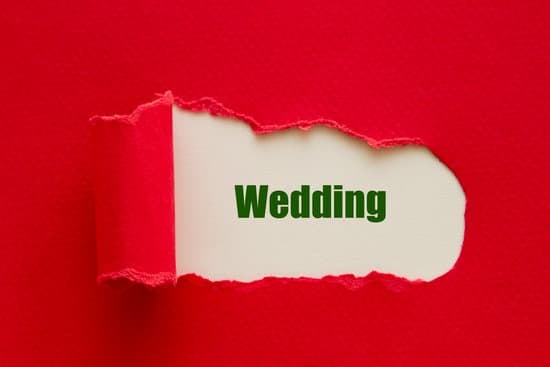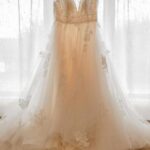Is it ok to wear black to a wedding? This age-old question has sparked debates and confusion among wedding guests for years. Understanding the tradition behind color choices for wedding attire can provide clarity on whether or not wearing black is acceptable. From the history of wedding attire to debunking myths surrounding black as a taboo color, this article will explore the origins, cultural shift, and modern acceptance of black wedding attire.
The history of wedding attire dates back centuries and is rooted in tradition and symbolism. Understanding the significance of colors in different cultures and eras can shed light on the reasoning behind certain dress codes for weddings. Additionally, debunking myths surrounding black as a taboo color at weddings can provide insight into the origins and validity of this long-standing rule.
As societal norms evolve, so do fashion trends and cultural customs. The shift towards modern acceptance of black wedding attire has become increasingly prevalent in recent years. Exploring this cultural shift and understanding the etiquette and consideration involved in choosing black attire for a wedding can help individuals make informed decisions when selecting their outfit for such occasions.
Debunking Wedding Attire Myths
When it comes to wedding attire, there are many myths and taboos that have been passed down through generations. One of the most debated topics is whether it is acceptable to wear black to a wedding. Traditionally, black has been seen as a color of mourning and is often associated with funerals rather than celebrations. However, in modern times, the rules around wedding attire have evolved, and wearing black to a wedding is no longer strictly taboo.
To understand the stigma attached to wearing black to a wedding, it’s important to consider the history of wedding attire. Traditionally, weddings were seen as joyous occasions where guests would wear bright and colorful outfits to celebrate the union of two people. Black was reserved for more somber events, such as funerals or periods of mourning. Over time, this tradition has shifted, and many couples are now open to guests wearing black to their weddings.
Despite the shift in attitudes towards black wedding attire, there are still factors to consider when choosing an outfit for a wedding. It’s essential to be mindful of cultural and religious customs, as well as the preferences of the couple getting married. While wearing black may be acceptable in some circles, it’s important to approach the decision with elegance and respect.
- When considering wearing black to a wedding:
- Consider the formality of the event
- Check with the couple or hosts for any specific dress code
- Choose accessories that add pops of color for balance
As societal norms continue to evolve, so do fashion choices for weddings. Ultimately, whether it is okay to wear black to a wedding depends on various factors including personal style, cultural influences, and respect for tradition. With careful consideration and tactful styling choices, wearing black can be both stylish and appropriate for celebrating love and commitment on someone’s special day.
Breaking Down the Black Is Taboo Rule
Black is often considered to be a taboo color to wear to a wedding, but where did this idea originate, and is it really valid? Let’s break down the history and origins of this rule to understand its significance.
1. Historical Origins: The tradition of avoiding black at weddings dates back to Victorian times when black was the color of mourning. It was considered inappropriate to wear black to a joyous occasion like a wedding, as it was associated with sadness and loss.
2. Validity of the Rule: In modern times, the taboo against wearing black to a wedding has been challenged. Many believe that this rule is outdated and no longer holds true in today’s society. While some may still adhere to this tradition, others argue that black can be a stylish and elegant choice for wedding attire.
3. Cultural Significance: The taboo against wearing black to weddings varies across different cultures and regions. In some cultures, such as Chinese and Japanese, black is traditionally worn at funerals and symbolizes mourning, making it inappropriate for festive occasions like weddings. However, in Western culture, attitudes towards wearing black to weddings have shifted over time.
As we examine the origins and validity of the rule against wearing black to a wedding, it becomes evident that while there may be historical significance behind this taboo, modern perspectives on fashion have led to a more open-minded approach towards color choices for wedding attire.
Black Wedding Attire
In recent years, there has been a cultural shift in the perception of wearing black to weddings. What was once considered taboo and inappropriate is now increasingly accepted and even embraced by many couples and wedding guests. This shift in attitude towards black wedding attire reflects a broader change in societal norms and fashion trends.
Changing Traditions and Norms
Traditionally, black was seen as a color reserved for mourning and somber occasions, making it unsuitable for joyous events like weddings. However, as social customs evolve, so too do the rules surrounding wedding attire. Many couples are now more open to the idea of guests wearing black to their weddings, recognizing that personal style and self-expression are important factors in how people choose to dress for such special occasions.
Modern Acceptance
While some may still frown upon the idea of wearing black to a wedding, it is clear that there is a growing acceptance of this once-controversial choice. In fact, many celebrities and fashion influencers have been seen sporting black ensembles at high-profile weddings, signaling a shift towards modern acceptance of black wedding attire. As long as the outfit is tasteful and respectful, wearing black can be a stylish and sophisticated choice for wedding guests.
Respecting Personal Expression
Ultimately, the decision to wear black to a wedding depends on individual preferences and the specific circumstances of the event. While it is important to consider traditional etiquette and cultural sensitivities, it is also essential to respect personal expression. If done with elegance and consideration for the occasion, wearing black to a wedding can be perfectly acceptable in today’s modern cultural landscape.
Etiquette and Consideration
When it comes to choosing the perfect attire for a wedding, there are several factors to consider. One of the most common questions that arise is, “Is it ok to wear black to a wedding?” Traditionally, wearing black to a wedding was considered taboo as it was seen as a color of mourning and bad luck. However, in modern times, the rules around wedding attire have become more relaxed and wearing black to a wedding is now widely accepted.
One of the main factors to consider when choosing black attire for a wedding is the formality of the event. If the wedding is a formal evening affair, then wearing a classic black dress or suit may be entirely appropriate. However, if the wedding is during the daytime or has a more casual dress code, opting for lighter colors may be more suitable.
Another important consideration is the cultural and personal beliefs of the couple getting married. Some cultures and families may still hold onto traditional views about black being an unsuitable color for weddings. In such cases, it’s essential to respect these beliefs and choose an alternative color for your attire.
It’s also crucial to consider the venue and theme of the wedding when deciding whether or not to wear black. For example, if the wedding is taking place at a beach or garden setting with a light and airy theme, choosing black attire may not be in line with the overall ambiance. Ultimately, when deciding on wearing black to a wedding, it’s important to take into account both traditional etiquette and modern sensibilities.
| Factors | Description |
|---|---|
| Formality of Event | Consider if it’s a formal evening affair or daytime/casual event |
| Cultural Beliefs | Respect the couple’s cultural views on suitable wedding attire colors |
| Venue and Theme | Take into account where the wedding is held and its overall theme when making attire choices |
Styling Tips
When it comes to wearing black to a wedding, it’s essential to choose your outfit with elegance and respect for the couple getting married. Follow these styling tips to ensure that you look appropriate and tasteful at the event.
Choose the Right Fabric
When selecting black attire for a wedding, consider the fabric of your outfit. Opt for high-quality materials such as silk, chiffon, or lace for a sophisticated and formal look. Avoid fabrics that may appear too casual or inappropriate for a wedding setting, such as denim or jersey.
Accessorize Thoughtfully
To elevate your black ensemble for a wedding, accessorize thoughtfully. Add a pop of color with accessories like statement jewelry, a colorful clutch, or vibrant shoes. This will help balance out the darkness of your outfit and add visual interest to your overall look.
Consider the Dress Code
It’s important to consider the dress code specified on the wedding invitation when choosing your black attire. If the dress code is black-tie or formal, opt for a floor-length gown or a chic tuxedo. For semi-formal or cocktail attire weddings, choose a knee-length dress or suit in black with stylish details and accessories.
By following these styling tips, you can confidently wear black to a wedding while showing respect for the event and adhering to proper etiquette. Remember that ultimately, it’s about celebrating the union of the couple getting married while feeling comfortable and confident in your chosen attire.
Alternative Colors and Options
Black is a classic color that exudes elegance and sophistication, which is why many people may be hesitant to explore alternative colors for wedding attire. However, there are several other options that can be just as stylish and appropriate for a wedding ceremony.
One popular choice is navy, a color that is dark and formal but not as somber as black. Navy pairs well with a variety of accessories and can easily be dressed up or down depending on the formality of the event.
Another option to consider is deep jewel tones such as emerald green, burgundy, or deep purple. These colors add richness and depth to your outfit while still maintaining a sense of formality. Jewel tones are especially popular for fall and winter weddings when darker colors are more seasonally appropriate.
For those who prefer lighter hues, consider wearing a soft grey or taupe. These neutral tones are perfect for spring and summer weddings and can be paired with colorful accessories for a pop of personality. Additionally, lighter colors are often associated with celebration and joy, making them suitable choices for wedding attire.
Ultimately, the key to choosing an alternative color to black for wedding attire is to select a shade that reflects the formality of the event and complements your personal style. By exploring different color options, you can easily find an outfit that is both respectful and stylish without feeling restricted by traditional dress codes.
| Alternative Colors | Advantages |
|---|---|
| Navy | Formal yet less somber than black; versatile for different accessories |
| Jewel Tones (emerald green, burgundy, deep purple) | Add richness and depth; suitable for fall/winter weddings |
| Soft Grey or Taupe | Reflect celebration and joy; suitable for spring/summer weddings; easily paired with colorful accessories |
Final Thoughts
In conclusion, the decision to wear black to a wedding is ultimately a personal one, influenced by both tradition and modern acceptance. The history of wedding attire and color choices has evolved over time, and while black was once considered taboo, attitudes have shifted. Debunking the myth that black is off-limits for a wedding, it’s important to understand the origins of this rule and question its validity in today’s society.
While it is now widely accepted to wear black to a wedding, etiquette and consideration should still guide our fashion choices. Factors such as the formality of the event, cultural or religious customs, and the preferences of the couple getting married should all be taken into account when deciding on attire. It is crucial to approach black wedding attire with respect and elegance, making sure that the outfit is appropriate for the occasion.
Ultimately, when it comes to choosing what to wear to a wedding, it’s essential to consider the unwritten rules as well as personal preferences. While black may be acceptable in most cases today, there are always alternative colors and options available for those who prefer not to wear black.
Ultimately, the most important thing is for guests to feel comfortable and confident in their choice of attire while also honoring the significance of the special day for the couple getting married.
Frequently Asked Questions
Is It Inappropriate to Wear Black to a Wedding?
It is generally considered inappropriate to wear black to a wedding, especially for women. Black has traditionally been associated with mourning and funerals, so wearing it to a joyful event like a wedding may be seen as disrespectful.
What Colors Are Not Appropriate to Wear to a Wedding?
Apart from black, other colors that are typically not appropriate to wear to a wedding include white (which can overshadow the bride), red (which can be seen as attention-grabbing), and overly flashy or neon colors that might not be in line with the formality of the event.
Can We Wear Black Clothes in Wedding?
While there used to be a firm rule against wearing black to weddings, this has become more relaxed in recent years. Now, it is more acceptable for guests to wear black clothing, especially if it is a well-tailored and formal outfit.
However, it’s always best to check with the couple or refer to the wedding invitation for any specific dress code guidelines.

I have been involved in marriages for over 20 years helping couples and singles understand more about them.





